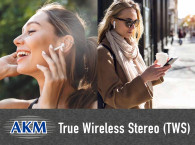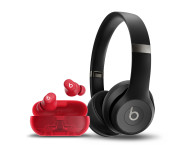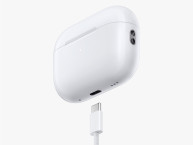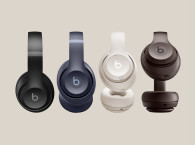
The second-generation AirPods Pro remain faithful to the same - already iconic - design, but improve in all fronts. The simple message from Apple is that these offer better ANC, cancelling up to twice as much noise over the original model, while extending battery life. The more detailed highlight is that the new AirPods Pro bring major upgrades to Transparency mode, making it adaptive with active processing, and implement Personalized Spatial Audio, which means the process of loading HRTF profiles, as announced in the iOS 16 update preview.
To enable Personalized Spatial Audio, users just need to point the TrueDepth camera on iPhone (front) to their ears. The captured information is used to create a personal HRTF profile for Spatial Audio, which is then enhanced even more with dynamic head tracking for content viewed on any iPhone, iPad, Mac, and Apple TV. Those are mostly software-enabled features that are part of iOS, much as the Accessibility features for people with disabilities, or Headphone Accommodations and Conversation Boost for hearing enhancement. This is an area that Apple has been improving directly through software, firmware and OS updates.

In fact, many of the features highlighted by Apple at its traditional iPhone launch event, are software-based and will also be available in the current AirPods Pro with iOS 16 and related firmware updates (and more will be announced in the future). Of course, the second-generation AirPods Pro will enhance those features with Bluetooth 5.3 and a new more powerful H2 processor, which is the platform that enables improving the firmware features.
Apple doesn't say much about H2 for now, but the previous H1 is now built into the new MagSafe charging case, which says a lot. This MagSafe charger, can also be charged with an existing Apple Watch charger, any Qi-certified surface, or the Lightning connector. Yes, there isn't USB-C and likely there will never be because Apple will simple use MagSafe wireless charging in the future.
On that note, it needs to be said that the punters that immediately criticized Apple because the iPhone 14 "still doesn't come with USB-C" have no idea what they are talking about and are likely the same people that complain "the iPhone no longer comes with a charger". Appropriately, the AirPods Pro come with a Lightning to USB-C cable on the box which is ironic since those complaining about Apple still using Lightning, are mostly still using USB Type-A chargers anyway.
The Lightning connector and specification IS what made USB-C possible, and Apple's contributions to Type-C and USB specifications are known and well documented. If Apple had not introduced the Lightning connector in 2012, the world would still be using flimsy microUSB connectors and unreliable derivatives. Likewise, if Apple had not adopted Qi and perfected wireless charging with MagSafe, we would be all forced to continue to use cables to charge - which very soon will go the same way as the SIM card.

For those who care about the two fundamentals in headphones and earbuds - sound and battery runtime - Apple did not disappoint. There is a new low-distortion audio driver that will be able to better translate the dynamics of a signal that still needs to sound loud, even if eventually interrupted by an occasional awareness sound. This is also facilitated by a new custom amplifier that Apple says offer richer bass and crystal-clear sound.
And the second-generation AirPods Pro earbuds offer 1.5 hours of additional listening time over the first generation, for a total of up to six hours with Active Noise Cancellation. Using the case for four additional charges, users can enjoy up to 30 hours of total listening time with Active Noise Cancellation — a full six hours more than the previous generation. The all-new charging case is sweat- and water-resistant, and includes a lanyard loop for those who like those things. The U1 processor enables Precision Finding, which means that users with an iPhone can locate their charging case with guided directions - not just simply finding it via Find My as it was possible already. The charging case also has a built-in speaker now, generating louder tones, so it’s even easier to locate.


The other thing that Apple never forgets to remind us, is that the AirPods Pro use 100 percent recycled rare earth elements in all magnets and — for the first time — 100 percent recycled gold in the plating of multiple printed circuit boards. The case also uses 100 percent recycled tin in the solder of the main logic board, and 100 percent recycled aluminum in the hinge. Redesigned packaging eliminates the outer plastic wrap, and 90 percent or more of the packaging is made using fiber-based materials.
The AirPods Pro 2nd generation will be available in stores beginning September 23, 2022, which also serves to show that this was a carefully managed announcement in times of manufacturing and supply chain constraints, leaving a more extreme design update to the next generation. This will likely arrive in two years time, when we will know if Apple will support Bluetooth LE Audio (I say yes because of LC3) and eventually finds a way to stream ALAC (lossless) to the AirPods using UWB. But no one makes a decision of buying AirPods or not based on that.
www.apple.com








